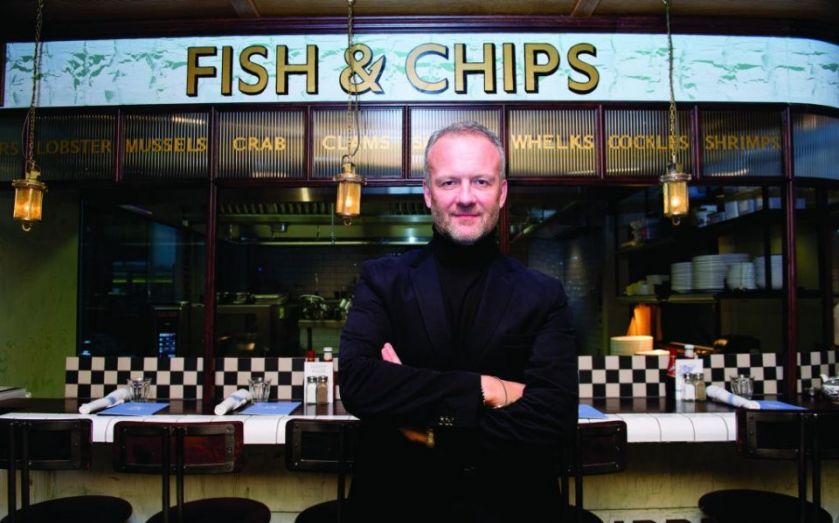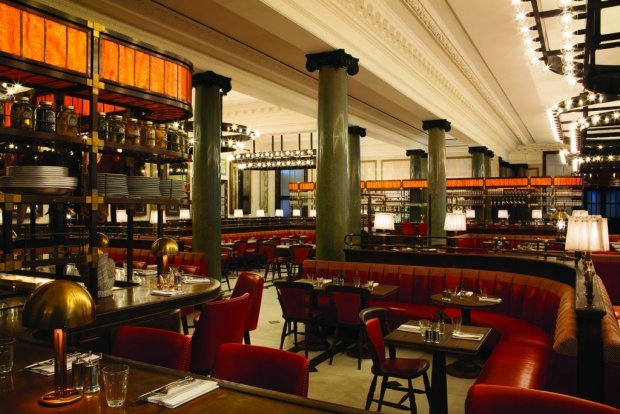| Updated:
Restaurateur Des McDonald discusses the burger revolution, forests and what it means to have cooking in your blood

Sitting in your own month-old restaurant would be extremely exciting for most people. It is for Des McDonald too, except this is one of six – and they’ve all opened within the last two years. His second branch of The Fish & Chip Shop is the latest, and it’s bringing the City what McDonald describes as “a homage to fish and chips, but with a little extra”.
The restaurant entrepreneur is also the owner of Holborn Dining Room, Camden’s Q Grill, Q on Ice at Canary Wharf Ice Rink, and Le Chalet on the rooftop at Selfridges. And when you ask about the thinking behind each, it’s clear that this is someone who knows the value of trends. While The Fish & Chip Shop does “posh fish and chips, but with great craft beer, cocktails and shellfish,” brasserie, deli and all-round “foodie destination” Holborn Dining Room hosted this year’s Bafta after party.
INSIDE OUT
Kitchens – and business – are in McDonald’s blood. He comes “from an Irish family of farmers and bakers”. His uncle owns restaurants in San Francisco, while his father “did very well in the corporate environment.” As he sees it, this provided the ingredients for his success: it’s down to “hard work, tenacity and being around a long time!”
The enduring memory of childhood is of working in kitchens and restaurants. “I’m fortunate in that I’ve never thought of much else – it was very much second nature. I love the energy. It’s like the theatre. You do your preparation, then you’re live.” There was one point when, at 17, he wanted to be a fireman, But “my father convinced me it’d be a bad idea.”

Midtown delight: Holborn Dining Room in the Rosewood Hotel
By 26, McDonald was head chef at the legendary Ivy restaurant. The sale of holding company Caprice in 1998 landed him the job of managing director of seven restaurants. It was a turning point, he says – a challenge that opened doors. Rising to group chief executive, he’s put his brains behind several London names: Scott’s, Sheekey Oyster Bar, Rivington Grill and Dean Street Townhouse. He later became the group chief executive of Soho House. Private members clubs are “different worlds”, he muses – Soho House is a brand that’s “gone from strength to strength. Folks like to be connected to a brand they like. [Soho House] is good at making local connectors, and it’s a very good operator.”
With three decades of experience under his belt, along with several board positions, McDonald made the decision that it was time to go it alone. Putting some of the brands and ideas he’d cooked up over the years into practice was “always the next hurdle. In the back of my mind, I’ve always been fairly entrepreneurial – it was the right time.” He says every entrepreneur needs to remember that some ideas will work, and some just won’t. But there’s that English thing, he adds – “we don’t like to admit defeat”.
A NEW GAME
As an industry veteran, McDonald didn’t need to grapple around for funding (“of course it’s much easier to take a proven track record to investors”), but still chose to turn to friends, family, and his own pockets: “with your first restaurant, you have to have skin in the game – that’s important in proving your brand.” The government’s enterprise investment scheme is great, he says, “but there does need to be more entrepreneurial relief to help people get over that first hurdle.”
Sticking around for 32 years also means you see some changes. “The last five years have seen the world change a lot. Technology means the rules of engagement have changed. Whatever you’re offering customers, you have to be consistent every day.” McDonald recognised at the outset that people want a dynamic relationship with the services they use. His rewards card offers customers something extra at any restaurant within the group. “It means we’re a community. Customers like to be connected to what you’re doing, whether it’s via a newsfeed or a blog. We live in a rewards world, where customers want to know what’s going on and feel like they’re getting preferential treatment.”
And the explosion of social media has changed the restaurant industry elsewhere, McDonald says. “We’re better travelled – we can get inspiration from all over the world and share it with others.” Not only that, but the actual eating experience has changed: “customers used to pick up a knife and fork – they now pick a camera phone. They want to log their experience, and then share it.” Alongside this, people are eating out more, with a higher quality of meal more affordable. “Customers are a lot more discerning, so you’ve got to be great at sourcing. Really, it’s about being more of a purist.”
Even for the seasoned professional, some changes in the climate can come as a real shock: “If you’d said to me 10 years ago that there would be restaurants that’ll serve just burgers, or chicken, or burger and lobster, I’d have said, ‘you’re mad.’”

On the roof of Selfridges – Le Chalet is part of McDonald's Q Grill
OLD FASHIONED HARD WORK
But some things remain untouched by the passage of time. McDonald is quick to warn against sitting pretty when you do find success. “You’ve always got to know what your like-for-like sales are. Focus on quality, ingredients, your menu and numbers. Otherwise, it’ll come and bite you on the arse.” Successful business people will frequently “blind themselves with a portfolio” that allows them to “mask poor situations,” he says. His way round that is simple: “focus on your lowest common denominator”. And if you’re McDonald’s team, you get to experience some “weird stuff” to stay on the ball. “We use a virtual football pitch when we review our operational numbers. You can use a simple analogy to explain to your team why, for example, you don’t need as many staff on a Monday as you do on a Thursday.”
GRUB HUB
McDonald’s 500-strong staff is only set to get bigger. His first target is 10 restaurants, then 20, then 30. He’s keen to grow in London, but is also looking further afield for sites – Bristol and Manchester are high up the hit list. Feedback, he says, has been good, and he’s confident the model has huge potential. “But you have to take baby steps – don’t trip yourself up by trying to grow too quickly”.
McDonald has recently taken on 10 students from his old college. “It was an experiment, but it’s been fascinating to see how they’ve all developed. They’ve embraced it and done really well – I’m proud of them.” The group are now off to Florida for a placement, which touches on one of McDonald’s few regrets. “I wish I’d done more of that. The world is such a small place now, and there’s so much inspiration out there. I was given the opportunity to work in the States when I was younger. I went for just two months; I should’ve stayed for longer.”
But the key to moving forward, he says, is to not take yourself too seriously and keep a sense of humour. What would he be doing in a different life? “I like keeping fit and the outdoors… I’d probably be working in a forest.”
DES McDONALD's CV
Company name: Des McDonald Restaurants Etc
Founded: 2012
Turnover: £10m
Number of staff: 500
Age: 49
Born: East London
Lives: Canary Wharf
Studied: Hospitality Management at Westminster College
Drinking: White Burgundy
Eating: Generally great, simple ingredients. More protein than carbs
Currently reading: The Churchill Factor, by Boris Johnson
Favourite business book: Blue Ocean Strategy, by Renee Mauborgne and W Chan Kim
Talents: I’m an ideas man and lead by example. I like self-discipline
Heroes: My father; his work ethic
First ambition: To be head chef at 25. I was by 23
Awards: Swimming and rugby
Motto: “Lead from the front”
Most likely to say: “I can”
Least likely to say: “I can’t”